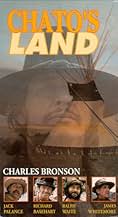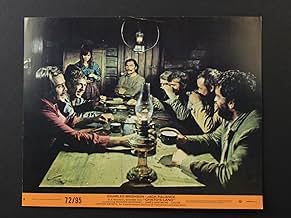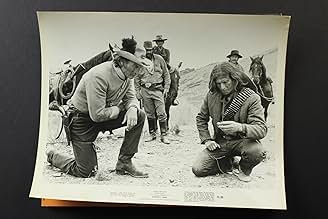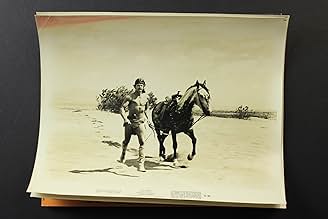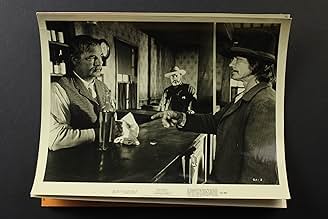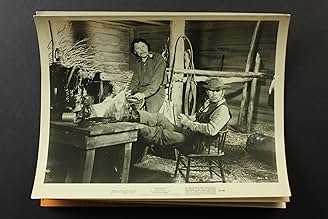PUNTUACIÓN EN IMDb
6,6/10
6,9 mil
TU PUNTUACIÓN
En la década de 1870 en Nuevo México, un mestizo mata a un alguacil intolerante en defensa propia, pero la pandilla que finalmente lo caza se encuentra en territorio peligroso.En la década de 1870 en Nuevo México, un mestizo mata a un alguacil intolerante en defensa propia, pero la pandilla que finalmente lo caza se encuentra en territorio peligroso.En la década de 1870 en Nuevo México, un mestizo mata a un alguacil intolerante en defensa propia, pero la pandilla que finalmente lo caza se encuentra en territorio peligroso.
Reseñas destacadas
Chato's Land is directed by Michael Winner and written by Gerry Wilson. It stars Charles Bronson, Jack Palance, James Whitmore, Simon Oakland, Richard Baseheart, Ralph Waite and Richard Jordan. Shot on location in Andalucia, Spain, with photography by Robert Paynter, it's musically scored by Jerry Fielding. Plot finds Bronson as half Apache, Pardon Chato, who is forced to kill the local sheriff in self defence and finds himself being hunted by a town posse led by Captain Quicey Whitmore (Palance). However, as the posse trail him into the wilderness it becomes apparent that the tables have been turned, with Chato given further cause to inflict harm upon his pursuers.
The first of six collaborations between Charles Bronson and Michael Winner, Chato's Land finds the pair setting the marker for what would define their work. With the Western genre going thru a resurgence, Chato's Land is very in-keeping with the type of Western that was being released in the early 70's: namely violent, uncompromising and certainly gritty. These things, as history now shows, were tailor made for Winner, who perfectly utilises Bronson's silent and brooding assets to great effect.
Often suspected to be an allegory of the United States' involvement in Vietnam, it's thematically correct in that respect. But the timing of the film would suggest this to not be the case. Chato's Land is more than just a revenge Western; a film about white men out of their usual terrain being pursued by a man of a different ethnicity, it wants to, and does quite well, be a picture dealing in racism, violence and the folly of hypocritical justice. But even tho Wilson's script brings these issues to light, they are not fully formed, with Winner at times dragging the film to a stand-still. However, the group dynamic is a good one, with the inevitable character differences creating a tinderbox waiting to ignite, while Winner doesn't skimp over the violence, puncturing the narrative with savage thrusts.
Bronson was 50 years old when making the film, his physicality here is very impressive. The role of Chato is hardly a stretch for him, in fact it's very much a perfect fit. He's basically asked to be a phantom in the landscape, but he casts an imposing presence each time he's called on to deliver some Chato justice. In pursuit are a mixed bunch of actors, with Palance, Whitmore and Baseheart the obvious professional standouts, while Simon Oakland leaves an indelible mark as grizzled father of the Hooker boys, Jubal. Fielding's (The Wild Bunch) score is efficient, but workmanlike, and Paynter's (Lawman) photography never really makes the landscape as imposing as it should be. Overall it's a mixed bag, but for fans of revenge type Westerns, and Palance, it's easy to recommend, but it still should have been more intelligent than it ultimately is. 7/10
The first of six collaborations between Charles Bronson and Michael Winner, Chato's Land finds the pair setting the marker for what would define their work. With the Western genre going thru a resurgence, Chato's Land is very in-keeping with the type of Western that was being released in the early 70's: namely violent, uncompromising and certainly gritty. These things, as history now shows, were tailor made for Winner, who perfectly utilises Bronson's silent and brooding assets to great effect.
Often suspected to be an allegory of the United States' involvement in Vietnam, it's thematically correct in that respect. But the timing of the film would suggest this to not be the case. Chato's Land is more than just a revenge Western; a film about white men out of their usual terrain being pursued by a man of a different ethnicity, it wants to, and does quite well, be a picture dealing in racism, violence and the folly of hypocritical justice. But even tho Wilson's script brings these issues to light, they are not fully formed, with Winner at times dragging the film to a stand-still. However, the group dynamic is a good one, with the inevitable character differences creating a tinderbox waiting to ignite, while Winner doesn't skimp over the violence, puncturing the narrative with savage thrusts.
Bronson was 50 years old when making the film, his physicality here is very impressive. The role of Chato is hardly a stretch for him, in fact it's very much a perfect fit. He's basically asked to be a phantom in the landscape, but he casts an imposing presence each time he's called on to deliver some Chato justice. In pursuit are a mixed bunch of actors, with Palance, Whitmore and Baseheart the obvious professional standouts, while Simon Oakland leaves an indelible mark as grizzled father of the Hooker boys, Jubal. Fielding's (The Wild Bunch) score is efficient, but workmanlike, and Paynter's (Lawman) photography never really makes the landscape as imposing as it should be. Overall it's a mixed bag, but for fans of revenge type Westerns, and Palance, it's easy to recommend, but it still should have been more intelligent than it ultimately is. 7/10
A tale of western revenge, "Chato's Land" has a cast of many well known actors including Jack Palance, Richard Basehart, Simon Oakland, Ralph Waite, Victor French and James Whitmore as well as Bronson in the lead role as Pardon Chato.
Chato is a half-breed Apache who makes the mistake of visiting a town that is hostile towards Indians. Being set upon by the sadistic town Marshall, Chato kills the lawman in self defense and must run from a posse of the town's people led by Jack Palance as Quincy Whitmore. Palance is excellent as Whitmore, an ex-Confederate officer who still longs after the excitement that comes from waging war. Leading the town's men in pursuit of Chato, Whitmore is decked out in his Confederate officer's jacket and plummed hat. Along with Whitmore is Nye Buell (Basehart) dressed in top hat and frock coat offering his whiskey laden salty commentary along the way. Simon Oakland also does a fine job as Jubal Hooker, the vicious elder of the degenerate Hooker clan who takes control of the posse from Quincy and ultimately cause the death of several of the posse members.
This movie has some beautifully set scenery that captures the harshness of the desert land that Chato takes refuge in. Whitmore comments that the harsh land is something that a white man would just damn off to hell and forget, but to Chato who doesn't ask much or take much from the land, it is almost a living thing.
Chato is a half-breed Apache who makes the mistake of visiting a town that is hostile towards Indians. Being set upon by the sadistic town Marshall, Chato kills the lawman in self defense and must run from a posse of the town's people led by Jack Palance as Quincy Whitmore. Palance is excellent as Whitmore, an ex-Confederate officer who still longs after the excitement that comes from waging war. Leading the town's men in pursuit of Chato, Whitmore is decked out in his Confederate officer's jacket and plummed hat. Along with Whitmore is Nye Buell (Basehart) dressed in top hat and frock coat offering his whiskey laden salty commentary along the way. Simon Oakland also does a fine job as Jubal Hooker, the vicious elder of the degenerate Hooker clan who takes control of the posse from Quincy and ultimately cause the death of several of the posse members.
This movie has some beautifully set scenery that captures the harshness of the desert land that Chato takes refuge in. Whitmore comments that the harsh land is something that a white man would just damn off to hell and forget, but to Chato who doesn't ask much or take much from the land, it is almost a living thing.
A laconic Apache is pursued by a posse to solve a sheriff's death , dead in self-defense showdown by Chato (Charles Bronson) . Stalking the misfit group who are allegedly to be chasing him , after they attack his woman and family . A veteran confederate officer (Jack Palance) leads the posse (Victor French , James Withmore , Lee Patterson) along with three brutal brothers (Richard Jordan , Simon Oakland , Ralph Waite). Chino struggles to maintain his livelihood and later on , he seeks revenge .
This offbeat Western film displays excessive violence , noisy action and orgies of destruction of life and property . It's full of fury , sound , sadism and gratuitous violence . Characters are beaten, killed and raped . Pretty good Charles Bronson in his ordinary tough role , this film is one of Charles Bronson's 70s westerns ; his westerns made during the 1970s include Red sun (1971), Chato the Apache (1972), From noon till three (1976), Nevada Express (1975) and The White Buffalo (1977) . For Charles Bronson fans , it's full of what made his movies so popular . Although isn't among Bronson's stronger , this is one of his more viscerally effective movies . Striking and atmospheric musical score by Jerry Fielding , Sam Peckinpah's usual . Colorful cinematography by Robert Paynter reflecting splendidly the barren outdoors from Almeria (Spain) , as usual . The motion picture was well directed by Michael Winner . This is the first film out of six that Charles Bronson and Michael Winner made together . Winner had important commercial successes in the mid-70 with his fetish actor , Charles Bronson , achieving various box-office hits, such as ¨Deathwish I and II, furthermore, ¨The mechanics¨ and ¨The stone killer¨.
This offbeat Western film displays excessive violence , noisy action and orgies of destruction of life and property . It's full of fury , sound , sadism and gratuitous violence . Characters are beaten, killed and raped . Pretty good Charles Bronson in his ordinary tough role , this film is one of Charles Bronson's 70s westerns ; his westerns made during the 1970s include Red sun (1971), Chato the Apache (1972), From noon till three (1976), Nevada Express (1975) and The White Buffalo (1977) . For Charles Bronson fans , it's full of what made his movies so popular . Although isn't among Bronson's stronger , this is one of his more viscerally effective movies . Striking and atmospheric musical score by Jerry Fielding , Sam Peckinpah's usual . Colorful cinematography by Robert Paynter reflecting splendidly the barren outdoors from Almeria (Spain) , as usual . The motion picture was well directed by Michael Winner . This is the first film out of six that Charles Bronson and Michael Winner made together . Winner had important commercial successes in the mid-70 with his fetish actor , Charles Bronson , achieving various box-office hits, such as ¨Deathwish I and II, furthermore, ¨The mechanics¨ and ¨The stone killer¨.
Charles Bronson and director Michael Winner made the first of several films together in this western that was shot in Spain. Chato's Land boasts a fine cast of players most of whom don't make it through the end of the film.
Bronson plays Pardon Chato a mixed blood Apache just in town for supplies and a racist U.S. Marshal puts the prod to him. That's a big mistake as Bronson kills him in self defense. A bunch of self righteous citizens get up a posse after him. Their brand of justice includes raping his wife and killing his child in the bargain.
Jack Palance plays the nominal leader of the group, but he's got no control over the meanest of the bunch, a trio of brothers Simon Oakland, Ralph Waite, and Richard Jordan. Others in the party include James Whitmore and Richard Basehart.
Charles Bronson is always a nasty man to cross, never more so when on his own turf as he is in the Arizona desert. Bronson has honed this character to perfection. It's no accident that Winner was the director in the first three Death Wish films. Elements of this same plot are also to be found in a particular favorite Bronson film of mine, Mr. Majestyk.
Chato's Land is a good western with an impeccable cast. I do so love that sudden death ending in this film.
Bronson plays Pardon Chato a mixed blood Apache just in town for supplies and a racist U.S. Marshal puts the prod to him. That's a big mistake as Bronson kills him in self defense. A bunch of self righteous citizens get up a posse after him. Their brand of justice includes raping his wife and killing his child in the bargain.
Jack Palance plays the nominal leader of the group, but he's got no control over the meanest of the bunch, a trio of brothers Simon Oakland, Ralph Waite, and Richard Jordan. Others in the party include James Whitmore and Richard Basehart.
Charles Bronson is always a nasty man to cross, never more so when on his own turf as he is in the Arizona desert. Bronson has honed this character to perfection. It's no accident that Winner was the director in the first three Death Wish films. Elements of this same plot are also to be found in a particular favorite Bronson film of mine, Mr. Majestyk.
Chato's Land is a good western with an impeccable cast. I do so love that sudden death ending in this film.
There's a little in-joke that's included in Pardon Chato's (Charles Bronson) only line spoken in English; and that occurs in about the second minute of this savagely entertaining story about vigilantism running amok somewhere in the Old West.
We see Chato, at the saloon bar, waiting to get his whiskey when in comes the local Marshall Endersby (Jacob Meade), looking to kill himself an uppity mestizo. So, here's the in-joke: just before the Marshall draws to shoot, Chato says: "Back off, lawman!" Then he spins quickly, shooting from the hip to kill the Marshall. It's a joke, because the director, Michael Winner, in 1971, had already filmed a story called Lawman (by the same screen writer, Gerald Wilson) in which a Marshall hunts down a group of men – relentlessly, mercilessly and legally. (Note that Lawman is more highly regarded, at IMDb, than Chato's Land.)
Anyway, the story of Chato is double joke: here, the Marshall is out of the picture (no pun intended) immediately, and the hunters – the Posse Commitatus, a mixed bunch of misfits headed up by either ex-Captain Whitmore (Jack Palance) or Jubal Hooker (Simon Oakland), depending on how the plot unfolds – become the hunted when Chato begins the task of killing them – relentlessly, mercilessly...but, illegally, in this story. Oh, Chato has the moral high ground, many would argue; but, objectively, any court would find him guilty of manslaughter at the very least. And, man, what a slaughter it is! But, this is the Old West, where just about anything goes.
The story has many antecedents (about which Winner and Wilson would have been well aware): The Bravados (1958) with Gregory Peck as the hunter; Hombre (1967) with Paul Newman as the despised mestizo; and Valdez is Coming (1971) with Burt Lancaster as the hunter, and a Mexican to boot. You could probably add to that list. This film adds to it, of course, as being just another take on the good, ol' American pastime of vigilantes racing off to git themselves a hangin' afore nightfall, if possible. In that regard and if you have seen it, you shouldn't miss watching the heartbreak in The Oxbow Incident (1943) with Henry Fonda, heading up an all-star cast, who tries to stop the west's favorite method of dispensing rough justice.
The best part about Chato's Land is the land: the stark, unforgiving country that Chato uses to his advantage. Winner makes good use of long, wide angle shots to emphasize the harsh, bleak landscape; but, his studied close-ups of the characters are often almost works of art. Of the cinematography, I can only complain of the lighting – a good lot of the shoot was completed in pseudo-darkness, using blue filters, no doubt, and was quite annoying at times. Editing is up to par, though, and Jerry Fielding's music is suitably moody – although, I could have done without the military-type snippets.
After speaking that one English line, Chato sticks to Apache, or is silent throughout, as he gets on with his task. So, it's nice to see a man happy in his work, and who doesn't bother us with useless talk.
Highly recommended for all fans of Bronson and Palance.
We see Chato, at the saloon bar, waiting to get his whiskey when in comes the local Marshall Endersby (Jacob Meade), looking to kill himself an uppity mestizo. So, here's the in-joke: just before the Marshall draws to shoot, Chato says: "Back off, lawman!" Then he spins quickly, shooting from the hip to kill the Marshall. It's a joke, because the director, Michael Winner, in 1971, had already filmed a story called Lawman (by the same screen writer, Gerald Wilson) in which a Marshall hunts down a group of men – relentlessly, mercilessly and legally. (Note that Lawman is more highly regarded, at IMDb, than Chato's Land.)
Anyway, the story of Chato is double joke: here, the Marshall is out of the picture (no pun intended) immediately, and the hunters – the Posse Commitatus, a mixed bunch of misfits headed up by either ex-Captain Whitmore (Jack Palance) or Jubal Hooker (Simon Oakland), depending on how the plot unfolds – become the hunted when Chato begins the task of killing them – relentlessly, mercilessly...but, illegally, in this story. Oh, Chato has the moral high ground, many would argue; but, objectively, any court would find him guilty of manslaughter at the very least. And, man, what a slaughter it is! But, this is the Old West, where just about anything goes.
The story has many antecedents (about which Winner and Wilson would have been well aware): The Bravados (1958) with Gregory Peck as the hunter; Hombre (1967) with Paul Newman as the despised mestizo; and Valdez is Coming (1971) with Burt Lancaster as the hunter, and a Mexican to boot. You could probably add to that list. This film adds to it, of course, as being just another take on the good, ol' American pastime of vigilantes racing off to git themselves a hangin' afore nightfall, if possible. In that regard and if you have seen it, you shouldn't miss watching the heartbreak in The Oxbow Incident (1943) with Henry Fonda, heading up an all-star cast, who tries to stop the west's favorite method of dispensing rough justice.
The best part about Chato's Land is the land: the stark, unforgiving country that Chato uses to his advantage. Winner makes good use of long, wide angle shots to emphasize the harsh, bleak landscape; but, his studied close-ups of the characters are often almost works of art. Of the cinematography, I can only complain of the lighting – a good lot of the shoot was completed in pseudo-darkness, using blue filters, no doubt, and was quite annoying at times. Editing is up to par, though, and Jerry Fielding's music is suitably moody – although, I could have done without the military-type snippets.
After speaking that one English line, Chato sticks to Apache, or is silent throughout, as he gets on with his task. So, it's nice to see a man happy in his work, and who doesn't bother us with useless talk.
Highly recommended for all fans of Bronson and Palance.
¿Sabías que...?
- CuriosidadesCharles Bronson refused to play in the scene where he saves a naked woman. He refused because she was without clothes. Director Michael Winner eventually used a trick to make the scene without Bronson's agreement.
- PifiasSeveral times as the posse rides through the desert, the saguaro cacti props in the background can be seen jiggling and flapping their arms in the wind.
- Citas
Capt. Quincey Whitmore: Apaches don't leave tracks unless they got a reason.
- Créditos adicionalesThere are no closing credits or an end title--merely a simple cut to black.
- Versiones alternativasThe original UK cinema version was cut for violence and the later Warner video received 41 secs of cuts to horsefalls and the rape scene, though the print used was missing the shooting of the burning Indian and a shot of Jubal Hooker's face being hit with a rock. In 2004 most of the cuts were waived with only 14 seconds now missing to remove sight of horses being made to fall in a fashion that is prohibited under BBFC Policy and also by the Cinematograph (Animals) Act of 1937.
- ConexionesFeatured in Kain's Quest: Rambo: First Blood Part II (2018)
Selecciones populares
Inicia sesión para calificar y añadir a tu lista para recibir recomendaciones personalizadas
Detalles
Taquilla
- Recaudación en Estados Unidos y Canadá
- 421.031 US$
Contribuir a esta página
Sugerir un cambio o añadir el contenido que falta

Principal laguna de datos
What is the Canadian French language plot outline for Chato el apache (1972)?
Responde

